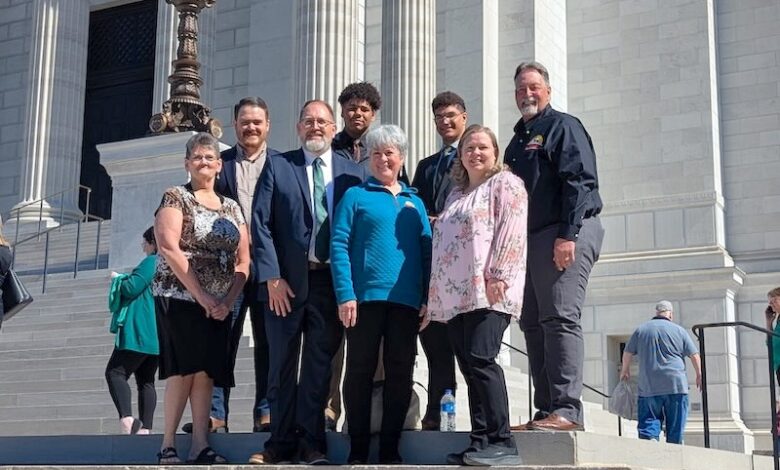Missouri Lawmakers Push to Expand Foster Care Through Faith Groups

The power of faith-based foster care took center stage at a Missouri Senate hearing this week, as lawmakers heard testimony about legislation to expand placement options for the state’s overwhelming number of foster children.
SPECIAL METRO VOICE REPORT
By Dwight Widaman | Editor
“I would not be here today,” Katrina Woods told senators, her voice steady as she described finding her mother dead when she was eight years old, enduring years of abuse, and finally finding hope at Show-Me Christian Youth Home. “I lived in poverty with no food for up to a week. There was a lot of physical abuse from my mother’s boyfriend and sexual abuse.”
Woods, now retired after an 18-year career as a police dispatcher and currently working for Missouri state courts, credits her survival to placement at Show-Me Christian Youth Home. “This act of love changed things for me,” she said, recalling a pivotal moment when her house parent’s simple words of pride broke through her anger and despair.
House Bill 764, sponsored by Rep. Jamie Gragg, and Senate Bill 525, introduced by Sen. Adam Schnelting, would establish a registration process allowing faith-based children’s homes to accept state placements while maintaining their religious independence.
CRISIS NUMBERS
The bills come as states face shortages of foster homes. According to a 2024 Department of Social Services report, the state has over 14,000 foster children but only 4,500 homes available to care for them. Officials estimate Missouri needs at least 1,500 additional foster homes just to meet current demand.
Mark Adkison, executive director of Shiloh Christian Children’s Ranch in Shelbina, emphasized the legislation’s focus on maintaining high standards while expanding options. “We have seen the bad players,” he told senators. “We want to make sure that if there are any other license-exempt facilities within the state of Missouri to meet those high standards that the state has put in with licensure.”
National foster care systems are struggling with similar challenges. Children often bounce between temporary homes, and sibling groups frequently face separation due to lack of space. Child welfare experts report increasing numbers of children being housed in offices due to placement shortages.
“Many Christian Homes in Missouri like Show-Me want to help; we hear the horror stories of children in inappropriate placements, and we hear from caseworkers who believe our ministries could be the ‘perfect fit’ for certain children – yet they are unable to place them here,” said Chad Puckett, director of Show-Me Christian Youth Home.
SYSTEM UNDER STRAIN

The proposed legislation arrives as Missouri’s foster care system faces mounting challenges. Since 2009, the number of children in state care has increased more than 60%, skyrocketing from 7,795 to over 12,500 in 2022. At the same time, the Department of Social Services reports a startling 55% turnover rate among frontline staff, creating a revolving door of caseworkers for at-risk children.
Foster system strain has reached critical levels across the country. “The lack of resources has created a vicious downward cycle of added strain on an already overloaded system,” Puckett said. “Children pay the heaviest toll as the turmoil keeps them in the system longer, moving from home to home, caseworker to caseworker.”
FAITH AND ACCOUNTABILITY
The perspective of veteran caregivers shaped Wednesday’s testimony. Denise Blew, who served as a house parent for 40 years at Shiloh Christian Children’s Ranch, explained why some choose to remain independent of state licensing.
“When parents place with us they know we will go to church. We go as a family unit,” said Blew, now a placement representative for Shiloh. “We want to be accountable, not to just Shiloh, or just to the state, we want to be accountable to God.”
PROPOSED SOLUTION
The bills would create a citizen board comprising both religious organization leaders and state officials to oversee participating homes. The Department of Social Services would retain final authority over placements and decisions, maintaining state oversight while allowing religious organizations to preserve their faith-based practices.
The legislation models itself after Florida’s long-standing program, where religious childcare organizations can choose between state licensing or accreditation through a religious association. Under the Missouri proposal, homes would need to meet comprehensive safety standards, including:
• Mandatory background checks for all personnel
• Regular safety and health inspections
• Compliance with fire and sanitary standards
• Published standards filed with DSS
• Regular oversight from both religious and state authorities
RELIGIOUS FREEDOM CONCERNS
Missouri remains one of just three states still offering religious exemptions to state licensing for foster and childcare facilities. This status has historically allowed faith-based organizations to operate independently, maintaining their religious practices without state intervention.
The shift away from state placements in religious homes began in 2008 and continued under the Democrat administration of Gov. Jay Nixon. Before then, facilities like Show-Me Christian Youth Home received about half their placements through the state system. Although no law changed, DSS stopped making these placements, effectively cutting off a significant resource for child placement.
“We are working with legislators and like-minded ministries to create an alternative option to state-based licensing that would add additional layers of accountability and protection that every child deserves,” Puckett said. “At no additional cost to Missouri, it would provide DSS with sorely-needed resources in their fight to alleviate the foster care crisis.”
OVERSIGHT AND IMPLEMENTATION
Under the proposed legislation, the Missouri Association of Christian Child Care Agencies (MACCCA) would serve as the qualifying association. To take on this role, MACCCA must demonstrate at least 20 years of operational history and maintain published standards filed with DSS.
“We just want to work and collaborate and be a willing participant of helping more kids,” Adkison said. “That’s at the heart of what we want with this legislation.”
The organization inspired by the Florida Association of Christian Child Care Agencies which successfully managed a similar program in the Sunshine State for decades. MACCCA launched its efforts in 2022, working to unite faith-based childcare ministries while promoting high standards of care, transparency, and accountability.
“MACCCA came to the table to find a ‘win-win’ solution,” Puckett said. “With the support of Senator Schnelting and Representative Gragg, we have renewed hope that good policy will override the destructive politics of animosity.”
LOOKING AHEAD
The legislation requires any qualifying association to publish and enforce written standards, maintain a board of directors capable of oversight, and submit to regular state review. The Department of Social Services director would retain authority to override recommendations, with appeals heard by the Administrative Hearing Commission.
If passed, the law would take effect August 28, 2025. Supporters say it could quickly expand placement options for Missouri’s foster children while maintaining necessary safety standards. The bills are currently under consideration in their respective chambers, with additional hearings expected in the coming weeks.
Woods’ testimony underscored the potential impact of expanding placement options. “If it wasn’t for the Missouri Family Division’s decision to place me with Show Me Christian Youth Home, and Show Me’s influence, I can honestly say I would not be here today,” she said. “My life and my successes are directly affected by this decision.”
The proposal comes at a critical time for child welfare systems nationwide. According to DSS’s 2024 report, “A Plan to Rebuild and Reform Children’s Division Phase II,” Missouri’s foster care population is double the national average per capita, ranking among the highest in the country for children in state care.
–Dwight Widaman has served as Editor of Metro Voice Christian Newspaper for 35 years.
To support our work providing a Christian media alternative, CLICK HERE.






